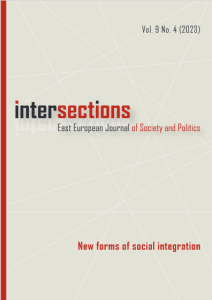 Az Intersections. East European Journal of Society and Politics az MTA Társadalomtudományi Kutatóközpont által alapított és kiadott nemzetközi, szabad hozzáférésű, lektorált társadalomtudományi folyóirat, amely 2014 januárja óra jelenik még negyedévente. Célja, hogy a Társadalomtudományi Kutatóközpont interdiszciplináris jellegének megfelelően különböző társadalomtudományi területekről, elsősorban a politikatudomány, szociológia, jog és az antropológia területéről közöljön írásokat. Fókusza elsősorban a közép-kelet-európai régióra irányul, ezen túlmenően a komparatív megközelítést szorgalmazza a régión belül valamint globális vonatkozásban is. A folyóiratot három év után a legtöbb nemzetközi folyóirat adtbázis, köztük Scopus, CEEOL, ERIH and Google Scholar, ProQuest Sociological Abstracts, EBSCO, JSTOR, Web of Science Emerging Sources Citation Index, Index Copernicus, DOAJ jegyzi.
Az Intersections. East European Journal of Society and Politics az MTA Társadalomtudományi Kutatóközpont által alapított és kiadott nemzetközi, szabad hozzáférésű, lektorált társadalomtudományi folyóirat, amely 2014 januárja óra jelenik még negyedévente. Célja, hogy a Társadalomtudományi Kutatóközpont interdiszciplináris jellegének megfelelően különböző társadalomtudományi területekről, elsősorban a politikatudomány, szociológia, jog és az antropológia területéről közöljön írásokat. Fókusza elsősorban a közép-kelet-európai régióra irányul, ezen túlmenően a komparatív megközelítést szorgalmazza a régión belül valamint globális vonatkozásban is. A folyóiratot három év után a legtöbb nemzetközi folyóirat adtbázis, köztük Scopus, CEEOL, ERIH and Google Scholar, ProQuest Sociological Abstracts, EBSCO, JSTOR, Web of Science Emerging Sources Citation Index, Index Copernicus, DOAJ jegyzi.
Intersections. East European Journal of Society and Politics (Intersections.EEJSP) is a peer-reviewed, open access journal focusing on social sciences (broadly understood) and promoting comparative thinking on Eastern and Central European societies in a global context.
The effectiveness of the EU’s rule of law conditionality mechanism
Theoretical observations based on the case of
Veronika Czina /HUN-REN Centre for Economic and Regional Studies
Intersections – Vol. 10 No. 1 (2024) Published: 2024-08-01
Abstract
The effectiveness of post-accession conditionality within the EU has been of pivotal importance for the EU in past years. The European Union has plenty of tools for monitoring the compliance of EU Member States; however, when it comes to enforcement mechanisms, EU institutions perform poorly. Respect for the rule of law is especially crucial in this regard, as certain Member States (i.e. Poland and Hungary) have committed violations in this area. Hungary has been subject to several infringement procedures due to failure to comply with EU law, and the Article 7 procedure has even been activated against it. In 2020, the EU decided to connect rule-of-law violations to the EU budget disbursement by introducing the rule-of-law conditionality mechanism, which was launched against Hungary in 2022. This paper evaluates this conditionality mechanism through the example of Hungary and assesses whether it is more effective than the previous tools used to address rogue Member State behaviour and prevent continuous rule-of-law violations on a national level.
Keywords:
EU conditionality, post-accession conditionality, rule of law conditionality mechanism, Hungary, rule of law


